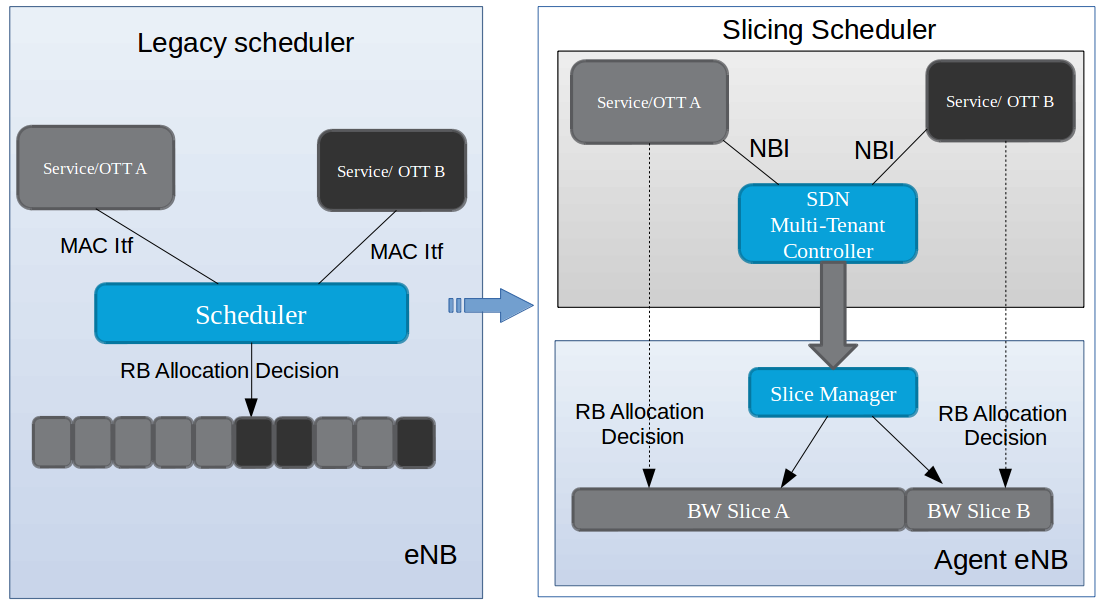Network Slicing Prototype for C-RAN architecture
The logic architecture of our
prototype is based on the C-RAN architecture implemented by the
OAI software [1] and on the SDN controller provided by FlexRAN
[2]. Our
prototype is in line with the NGFI
C-RAN architecure [1], wherein the
baseband processing functions are carried out at the Remote Cloud
Center (RCC) node, which in turns sends I/Q samples to the Radio
Remote Unit (RRU) via a fronthaul interface. Note that the
protoype utilizes an ethernet based fronthaul, i.e. the link between
the
RCC and the RRU, as described in [1]. The C-RAN architecture is
based on the IF4p5 splitting [1] implemented by OAI, which
refers to the split-point at the input (TX) and output (RX) of
the OFDM symbol generator. More details on the C-RAN splitting
solutions implemented in OAI are provided in [1].

In our prototype the RRU consists of an Ettus USRP B2100 card [3] which is connected to an Ubuntu Desktop computer via an USB 3.0 interface. The RCC, which implements the remaining levels of the LTE protocol stack, is executed in an Ubuntu laptop with an Intel I7 processor and 8 GB RAM. Moreover the laptop hosts a VMware Ubuntu virtual machine (VM) where all the functionalities of the Core Network are implemented by the OAI software. The laptop hosts also a FlexRAN controller, which consists of two main entities: the Master Controller and the Agent. The Master Controller is connected to the Agent, i.e. a software module built within the software of the OAI eNB. The FlexRAN Agent is the entity that separates the control plane and data plane of the OAI software and acts as a southbound interface (SBI) between the control plane, which is moved at the Master Controller side, and the dataplane which remains at the eNB side. By means of such an SBI, the Master Controller can interact with the Agent and collect information about the network state of the RAN. Moreover, the Master Controller offers a northbound interface (NBI) which can let a northbound application to implement an algorithm for configuring some RAN parameters in an abstracted way. The implementation details of the FlexRAN Controller are provided in [2]

We propose a network slicing solution for sharing the spectrum among multiple slices, which utilizes an SDN approach to manage the creation of each slice and dynamically configure the size of each slice on-demand, in accordance to some specific SLA constraints. More specifically, we focus on the real-time allocation of the bandwidth resources and we propose a slicing scheduling algorithm that is driven by a centralized SDN controller. The logic architecture of the the slicing scheduler is depicted in the above figure (right side), while the left part of this figure describes the scheduler architecture in a legacy LTE eNB.
The OTT providers can communicate a service request to the an SDN controller, named SDN Multi-tenant Controller, via a Northbound Interface, which is based on an HTTP interface provided by the FlexRAN Master Controller. For instance, the OTT provider could ask to the SDN Multi-tenant Controller to execute a service with a specific QoS target, for a number of users, which are located in a specific area, while respecting an average system throughput target. Accordingly, the SDN Multi-tenant Controller performs firstly an admission control, i.e. it verifies that the service request is in line with the pre-established SLA agreements and that the required QoS can be matched according to the real-time network state. Secondly, it allocates a slice to the OTT, by setting the following parameters:
- size, i.e. the total number of RBs to be used from that slice
- duration of the slice, expressed in number of Transmission Time Interval (TTIs)
- QoS target, e.g. the throughput target for aggregate traffic within the slice

The configuration of the slices can
be done manually for
testing purposes, via a web GUI, but also dynamically. In
fact the input values of the Slicing App can also come from a
complex slicing allocation algorithm.
Demo of Network Slicing Prototype
In the following video we
present a demo of the network slicing prototype. The aim of this demo
is to show the feasibility of the prototype in handling the creation and
configuration of network slices on-demand, taking into account
some inputs that are elaborated from an SDN-based slicing
application.
REFERENCES
- http://gitlab.eurecom.fr/oai/openairinterface5g/wikis/how-to-connectcots-ue-to-oai-enb-via-ngfi-rru
- X. Foukas, N. Nikaein, M. M. Kassem, M. K. Marina and K. Kontovasilis, FlexRAN: A Flexible and Programmable Platform for Software-Defined Radio Access Networks,ACM CoNEXT, California, USA, 12-15 Dec. 2016
- USRP B200/B210 Specification Sheet, avalaible online at https://www.ettus.com/product/details/UB200-KIT
- S. Costanzo, I. Fajjari, N. Aitsaadi and R. Langar, "A Network Slicing Prototype for a Flexible Cloud Radio Access Network", 15th IEEE Annual Consumer Communications Networking Conference (CCNC), Las Vegas, NV, USA, 12-15 Jan. 2018.
- S. Costanzo, I. Fajjari, N. Aitsaadi and R. Langar, "DEMO: SDN-based Network Slicing in C-RAN", 15th IEEE Annual Consumer Communications Networking Conference (CCNC), Las Vegas, NV, USA, 12-15 Jan. 2018.
